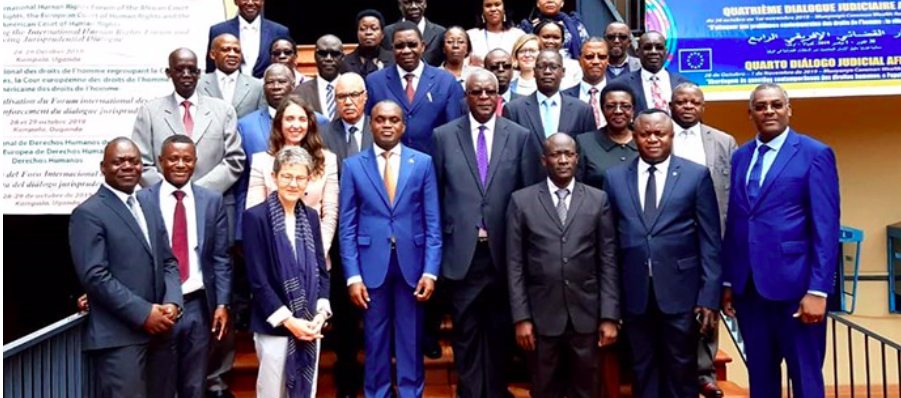The use of AI in judicial systems is being explored by judiciaries, prosecution services and other domain specific judicial bodies around the world. For example, in the criminal justice field, the use of AI systems for providing investigative assistance and automating decision-making processes is already in place in many judicial systems across the world. Considering rapid developments in this field, the challenges and opportunities related to harnessing AI in judicial systems and their implications for human rights and the rule of law must form part of discussions among stakeholders from the judicial ecosystem. Therefore, this online training course in the form of a Massive Online Open Course (MOOC) is being developed in cooperation with UNESCO’s category 2 centre CETIC and the IEEE in response to the needs expressed by UNESCO Member States, judges and other stakeholders.
Artificial Intelligence and Digital Transformation
Artificial Intelligence (AI) has enormous potential to be used for social good and achievement of the Sustainable Development Goals (SDGs). Even as it is being used to help address many of humanity’s most critical social issues, its use is also raising concerns about infringement of human rights like the right to freedom of expression, right to privacy, data protection, and non-discrimination. AI-based technologies offer major opportunities if they are developed in respect of universal norms, ethics and standards, and if they are anchored in values based on human rights and sustainable development.
New Online Course on AI and the Rule of Law
Register Here: Judges.org/ai-rol
The Massive Open Online Course (MOOC) on AI and the Rule of Law is an introductory course engaging judicial operators in a global and timely discussion around AI’s application and impact on the rule of law.
Structured around six modules, it unpacks the opportunities and risks of the increasing adoption of AI technologies across justice systems and AI’s impact for the administration of justice, particularly concerning human rights and AI ethics and governance issues.
The course is developed by UNESCO and The Future Society, with the support of Cetic.br|NIC.br, the National Judicial College, and IEEE SA. It was made possible by the kind contributions of the UNESCO Multi Donor Programme on Freedom of Expression and Safety of Journalists (MDP) and the Open Society Foundations.
Role of Judicial Actors in AI Governance

A two-day seminar on "Freedom of Expression and Safety of Journalists for Judges in Africa" and organized by UNESCO and the GIZ in 2019. © UNESCO
As the use of AI technologies advances, judicial systems are being engaged in legal questions concerning the implications of AI for human rights, surveillance and liability, among others. In addition, judicial systems are also using AI systems for judicial decision-making processes that have raised concerns for fairness, accountability and transparency in decision making by automated or AI-enabled systems.
The potential of AI is already being explored by many judicial systems that include the judiciary, prosecution services and other domain specific judicial bodies, around the world, in the criminal justice field, providing investigative assistance and automating/facilitating decision-making processes.
Nevertheless, the use of AI poses a wide range of challenges to be addressed: from pattern recognition, to ethics,biased decisions taken by AI-based algorithms, transparency and accountability. Self-learning algorithms, for instance, may be trained by certain data sets (previous decisions, facial images or video databases, etc.) that may contain biased data that can be used by applications for criminal or public safety purposes, leading to biased decisions.
Considering rapid developments in this field, the challenges and opportunities related to harnessing AI in the field of justice and how AI-based systems can help judicial actors in their roles within the administration of justice and to handle cases involving AI that impacts human rights must form part of discussions among stakeholders from the judicial ecosystem.
UNESCO’s Judges Initiative

UNESCO and Inter-American Court of Human Rights Human (IACHR) signed a Memorandum of Understanding (MoU) to strengthen the protection of freedom of expression, press freedom and safety of journalists in the Latin American and the Caribbean region. © UNESCO
Since 2014, UNESCO and its partners have been training judges and judicial actors on freedom of expression, public access to information and safety of journalists, mainly through Massive Open Online Courses (MOOC). More than 17,000 judicial actors have been trained in Latin America, in partnership with the Inter-American Court of Human Rights, as well as in Africa, where UNESCO has partnered with the Center for Human Rights of the University of Pretoria, the African Commission on Human and Peoples’ Rights, the African Court on Human and Peoples’ Rights and the Economic Community of West African States.
These training courses improve freedom of expression, public access to information and safety of journalists by reinforcing the capacities of judges and other actors of judicial systems on these issues. The courses provide judicial actors with an overview of relevant international and regional legal frameworks as well as new challenges brought by the Internet and other digital technologies.
Through a better understanding and knowledge of international and regional standards of freedom of expression and safety of journalists, judges and other members of the judiciary can better align their decisions with international and regional standards and good practices on these issues.
Building on the above experience, UNESCO and partners are developing the programme for capacity building of judicial actors concerning the use of AI in courts and by law enforcement, as well as to address the legal implications of AI judicial decisions based on international human rights standards.
AI and the Judiciary: A Massive Open Online Course?

UNESCO rolls out first African MOOC on freedom of expression and safety of journalists in 2017. © UNESCO
The need for engagement with judicial actors on AI-related issues has been recognized at the Athens Roundtable on AI and the Rule of Law, co-hosted by UNESCO, the Internet Governance Forum sessions on Rule of Law in the Digital Ecosystem, UNESCO’s AI Capacity Building Needs Assessment Survey in Africa and notably by participants under the umbrella of UNESCO’s Judge's initiative that has engaged more than 17,000 judicial operators.
To respond to these needs, an online training course in the form of a Massive Online Open Course (MOOC) is being developed, in cooperation with UNESCO’s category 2 centre CETIC and the IEEE, in direct response to the needs expressed by UNESCO Member States in Africa, judges and other stakeholders.
Objectives of the Online Course:
- Stimulate a participative dialogue with judicial operators on AI-related innovations in the judicial system and promote knowledge of digital innovations in the justice system;
- Facilitate knowledge exchange and experience sharing among judicial operators on artificial intelligence, existing norms and standards (hard and soft law) in the field, and its implications for human rights;
- Highlight existing case studies and best practices that translate ethical principles into practice both in terms of the use of AI in justice systems, and in cases involving AI impacting human rights.
Links:
- More information on UNESCO’s Judges Initiative is available here.
- More information on Rule of Law as a key concept in the digital ecosystem is available here.
- Survey of Judicial Operators on AI and the Rule of Law
- Judicial operators in 100 countries express interest in learning about AI and the rule of law with UNESCO
